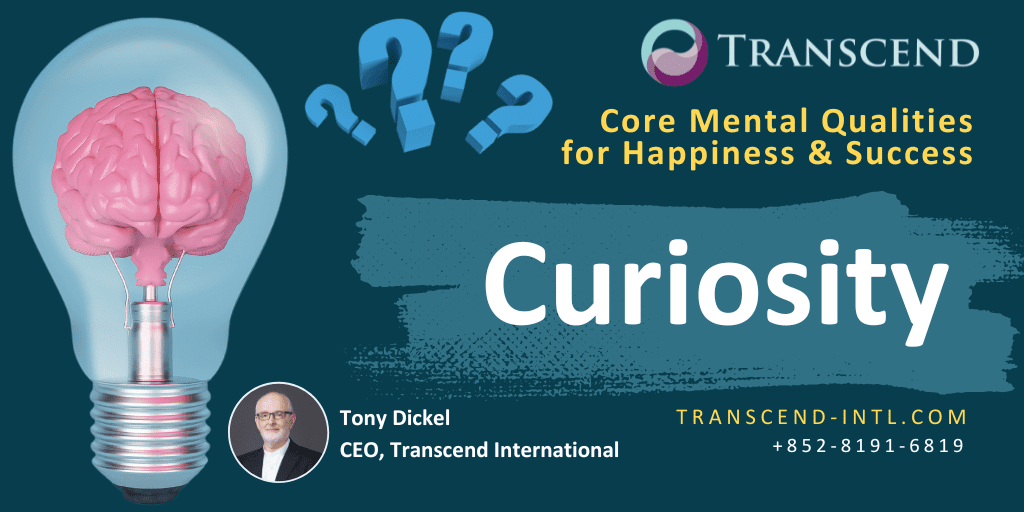In this issue we look at cultivating the third core mental quality for happiness and success – CURIOSITY.
CURIOSITY
Cultivating curiosity, as we define it, means to question our habitual, neurologically conditioned perceptions about people, situations, and our reactions to these perceptions. Curiosity allows us to see the positive potential in such situations, in people and within ourselves.
By default, curiosity declines as we learn through our experiences and is minimal when our perception of something and its associated response (reaction) becomes “hard wired” into our neural operating system. This can include potentially positive things (such as achieving mastery with a regularly practiced skill) or it can also include less than positive things (e.g. when we achieve mastery with rolling our eyes when someone disagrees with us or in saying yes when we mean no. We don't tend to think of these “negative” patterns as “mastery experiences” but it is, in fact, the same process of “practice makes permanent”. This mental habit formation related to events and phenomena is largely designed to keep us safe from predicted emotional trauma or significant discomfort. We automatically and instantly label almost everything we take in through our senses as “good, bad, appropriate, inappropriate, I want, I don't want etc etc., creating impulses which we react to before we know it. Facial expressions, body language and body sensations betray us and are rapidly perceived by similar processes occurring within those around us.
The trouble with the mind is that, while it is really good at protecting us from harm by compelling emotions, compelling thoughts and behaviours designed to protect us from threats, the threats the mind is “designed” to protect us from are not generally present in the modern world. Without such physical threats, our wonderful storytelling and predicting mind turns to protecting the various stories we carry around with us which, collectively, we might term as our “egos”. There’s nothing intrinsically “wrong” with this phenomenon as a whole, except where it drives behaviour which is, in fact, more dangerous, than that which it is trying to protect us from (which is often not, in any real sense, dangerous). For example, we may interrupt because our individual ego stories might tell us that we must always be the first to speak and cannot tolerate others not agreeing with us. However, when triggered, the behaviour is actually more dangerous than what it's trying to protect us from. There’s no tangible harm (and may be much benefit) in allowing others to fully express themselves, and when the “protective” behaviour arises it can genuinely damage us and interfere with things we really care about (getting a promotion, having great relationships, growing our teams etc). Thereby moments of presence, patience and then curiosity are very useful qualities that enable us to check in with our thoughts and emotions, compare with our aspirations and goals for ourselves and adjust if and as appropriate.
Fortunately the faculty of curiosity can be developed through directed reflection, self-observation and reflection, experimentation with practices all supplemented with the cultivation of mindfulness.
In fact, no moment is quite the same as any other. Everything is changing and everything is new. We never, in fact, know what is going to show up around the corner, no matter how much we try to control things. Training ourselves to look at our experience with curiosity, as if for the first time, opens our mind to see the unlimited potential in ourselves, in others and in all situations.
When we meet someone we know well, or when we have a conversation with someone, we can ask ourselves whether we see or hear what “really is” or whether our perception is coloured by what we think we already know. Do we see the vivid, present reality or an old collection of hidden memories?
Some Practices for Cultivating Curiosity
It is not too difficult to cultivate a curious and open mind through training.
Catch yourself noticing something unpleasant. Maybe something said? Maybe something as simple as an unpleasant taste, smell, noise, words from others or visual stimulus. When you notice this, simply stay with it. Release the judgement and ignore the impulse to “move away from ” or “resist” the stimulus. Simply maintain an open, curious, non-judging, witnessing mind, observing the experience and noticing how it changes over time.
It’s important to cultivate a “researchers mindset”. In so doing, you will find that your habitual perceptions are, very often, just reactions to your implicit, instantly accessed, hidden, or implicit, memories. You will find that the unpleasantness is a feeling that is created by your mind as the stimulus “connects” with this implicit memory. You will also see that everything is appearing and disappearing to the mind in a state of constant change.
You might also experience that you exaggerated the unpleasantness. It may have appeared to be the biggest problem in your life right now. As you looked upon it with curiosity, you noticed its power slowly disappearing, you experienced a more realistic perspective. The signal in itself did not contain any intrinsic information about whether it was good or bad, right or wrong. If this information was added, it was added by your learned habitual, and unique, patterns of perception.
As your practice progresses, you will develop the ability to observe even difficult feelings and insistent thought patterns. Having the courage to stay with these experiences as they appear helps us to see work and life from a more realistic perspective, both during the training and in everyday life. The difficult aspects of life become less difficult, not because they are changing but because you are changing the way you experience and relate to them.I

